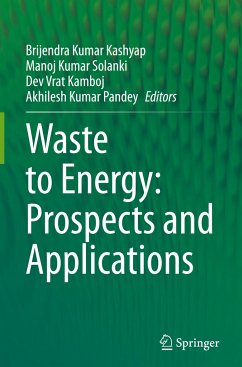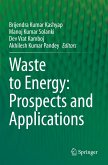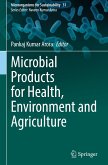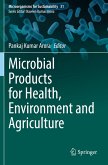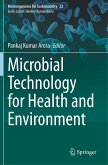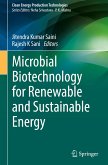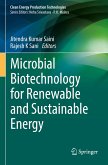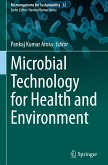Waste to Energy: Prospects and Applications
Herausgegeben:Kashyap, Brijendra Kumar; Solanki, Manoj Kumar; Kamboj, Dev Vrat; Pandey, Akhilesh Kumar
Waste to Energy: Prospects and Applications
Herausgegeben:Kashyap, Brijendra Kumar; Solanki, Manoj Kumar; Kamboj, Dev Vrat; Pandey, Akhilesh Kumar
- Gebundenes Buch
- Merkliste
- Auf die Merkliste
- Bewerten Bewerten
- Teilen
- Produkt teilen
- Produkterinnerung
- Produkterinnerung
This book addresses waste generation problems from various sectors, including industries, agriculture, and household. It focuses on how modern biotechnological approaches could help manage waste in an eco-friendly manner and generate precious bioenergy. It discusses the inadequate waste management systems damaging the environment and its adverse impacts on climate change-related problems. This book covers all the essential information regarding various types of waste and their management. It is a comprehensive compilation for understanding the efficient generation of bioenergy. It is a…mehr
Andere Kunden interessierten sich auch für
![Waste to Energy: Prospects and Applications Waste to Energy: Prospects and Applications]() Waste to Energy: Prospects and Applications149,99 €
Waste to Energy: Prospects and Applications149,99 €![Microbial Products for Health, Environment and Agriculture Microbial Products for Health, Environment and Agriculture]() Microbial Products for Health, Environment and Agriculture149,99 €
Microbial Products for Health, Environment and Agriculture149,99 €![Microbial Products for Health, Environment and Agriculture Microbial Products for Health, Environment and Agriculture]() Microbial Products for Health, Environment and Agriculture149,99 €
Microbial Products for Health, Environment and Agriculture149,99 €![Microbial Technology for Health and Environment Microbial Technology for Health and Environment]() Microbial Technology for Health and Environment149,99 €
Microbial Technology for Health and Environment149,99 €![Microbial Biotechnology for Renewable and Sustainable Energy Microbial Biotechnology for Renewable and Sustainable Energy]() Microbial Biotechnology for Renewable and Sustainable Energy186,99 €
Microbial Biotechnology for Renewable and Sustainable Energy186,99 €![Microbial Biotechnology for Renewable and Sustainable Energy Microbial Biotechnology for Renewable and Sustainable Energy]() Microbial Biotechnology for Renewable and Sustainable Energy186,99 €
Microbial Biotechnology for Renewable and Sustainable Energy186,99 €![Microbial Technology for Health and Environment Microbial Technology for Health and Environment]() Microbial Technology for Health and Environment149,99 €
Microbial Technology for Health and Environment149,99 €-
-
-
This book addresses waste generation problems from various sectors, including industries, agriculture, and household. It focuses on how modern biotechnological approaches could help manage waste in an eco-friendly manner and generate precious bioenergy. It discusses the inadequate waste management systems damaging the environment and its adverse impacts on climate change-related problems. This book covers all the essential information regarding various types of waste and their management. It is a comprehensive compilation for understanding the efficient generation of bioenergy. It is a relevant reading material (resource) for anyone who wishes to study waste management as Chemist, Biologist, Biotechnologist, Industrialist, Ecologist, Microbiologist, Economist, and all disciplines related to the environment.
Produktdetails
- Produktdetails
- Verlag: Springer / Springer Nature Singapore / Springer, Berlin
- Artikelnr. des Verlages: 978-981-33-4346-7
- 1st edition 2020
- Seitenzahl: 448
- Erscheinungstermin: 17. Februar 2021
- Englisch
- Abmessung: 241mm x 160mm x 30mm
- Gewicht: 834g
- ISBN-13: 9789813343467
- ISBN-10: 981334346X
- Artikelnr.: 60459274
- Herstellerkennzeichnung Die Herstellerinformationen sind derzeit nicht verfügbar.
- Verlag: Springer / Springer Nature Singapore / Springer, Berlin
- Artikelnr. des Verlages: 978-981-33-4346-7
- 1st edition 2020
- Seitenzahl: 448
- Erscheinungstermin: 17. Februar 2021
- Englisch
- Abmessung: 241mm x 160mm x 30mm
- Gewicht: 834g
- ISBN-13: 9789813343467
- ISBN-10: 981334346X
- Artikelnr.: 60459274
- Herstellerkennzeichnung Die Herstellerinformationen sind derzeit nicht verfügbar.
Dr Brijendra Kumar Kashyap is assistant professor at the Department of Biotechnology Engineering, Institute of Engineering and Technology, Bundelkhand University (IET, BU), Jhansi, India, and a member of the ongoing project TEQIP-III. His graduation and post-graduation are from Banaras Hindu University (BHU), Varanasi, and Ph.D. (pursuing) from Bundelkhand University, India. He had received numerous prestigious awards, including the young scientist award of Society of Bioinformatics and Biological Sciences (SBBS), India, JRF(NET)-CSIR, SRF-CSIR, SRF-ICAR, IIT-Fellowship, ARS(NET)-ICAR, GATE, DBT-Fellowship, etc. He had delivered numerous oral and poster presentations at various national and international conferences and had published more than 15 papers in peer-reviewed journals. He is having more than 15 years of teaching and research experience. Dr. Manoj Kumar Solanki did his Ph.D. (Microbiology) from Rani Durgawati University, India. He is a visiting scientist in the Volcani Center, Agricultural Research Organization, Israel. Dr. Solanki has published more than 31 peer-reviewed articles, edited three books, and delivered numerous oral and posters presentations in international meetings. Dr. Solanki has awarded a visiting scientist fellowship from the Guangxi Academy of Agriculture Sciences, China, in 2014-2016. During Ph.D., he has been awarded a Senior Research Fellowship from the Indian Council of Agriculture Research (ICAR), India. His primary research interest includes plants-microbes interaction, soil microbiology, plant disease management, and enzymology. Dr. Dev Vrat Kamboj is Scientist 'G' and heading Biotechnology Division at Defence Research and Development Establishment (DRDE), Gwalior. He earned his Bachelor's degree in Forestry, and Master's and Doctoral degrees in Microbiology from Haryana Agricultural University, Hisar. He received severalawards, notable among them are 'Young Scientist Award' from the Association of Microbiologists of India and the 'Scientist of the Year Award' from the Defence Research and Development Organization. His interest areas include Biodegradation and Biodefence, from which several patents and publications are to his credit. Dr. Kamboj was instrumental in developing 'Biodigester Technology' for eco-friendly disposal of human fecal matter widely used by Indian Railways, Armed Forces, and Civil Population. Prof. Akhilesh Kumar Pandey, Ph.D. (Botany) is working as vice-chancellor, Vikram University, India. His primary research interest includes Mycology and Plant Pathology, and he supervised 61 Ph.D. students. Prof. Pandey has published 240 research papers, 40 book chapters/reviews, and edited four books. He was awarded various national and international awards. He was an honorary member of the Research Board of Advisors, ABI, USA. He also servedas chief editor of the Society for Basic and Applied Mycology. He is also profoundly associated as a lifetime member in various academic bodies including, Indian Science Congress and Indian Phytopathological Society.
Part 1 Introductory Chapters.- 1 Emerging Frontiers of Microbes as Agro-waste Recycler.- 2 Microbes: the next generation bioenergy producers.- 3 Emerging and eco-friendly approaches for waste management.- 4 Ecofriendly microbial biofuel production from waste.- 5 Bioremediation: Current research trends and applications.- 6 Bioremediation: an approach for environmental pollutants detoxification.- 7 Bioethanol extraction and its production from agricultural residues for sustainable development.- Part 2 Biotechnological approaches.- 8 Byproduct valorization of vegetable oil industry through biotechnological approach.- 9 Omics tools: Approaches for microbiomes analysis to enhance bioenergy production.- 10 Omics (genomics, proteomics, metabolomics etc.) tools to study the environmental microbiome and Bioremediation.- Part 3 Industrial waste management.- 11 Microalgae: Omics approaches for biofuel production and biomedical research.- 12 WasteUtilization and Minimization in Food Industry.-13 Ligninolytic microbes and their role in effluent management of pulp and paper industry.- 14 Production of Polyhydroxyalkanoates using waste as raw materials. 15 Newer Aspects of Waste-to-Valorisation Technologies in Food Industry.- 16 Xylanase in waste management and its industrial applications.- 17 Organic Acid Production from Agricultural Waste.
Part 1 Introductory Chapters.- 1 Emerging Frontiers of Microbes as Agro-waste Recycler.- 2 Microbes: the next generation bioenergy producers.- 3 Emerging and eco-friendly approaches for waste management.- 4 Ecofriendly microbial biofuel production from waste.- 5 Bioremediation: Current research trends and applications.- 6 Bioremediation: an approach for environmental pollutants detoxification.- 7 Bioethanol extraction and its production from agricultural residues for sustainable development.- Part 2 Biotechnological approaches.- 8 Byproduct valorization of vegetable oil industry through biotechnological approach.- 9 Omics tools: Approaches for microbiomes analysis to enhance bioenergy production.- 10 Omics (genomics, proteomics, metabolomics etc.) tools to study the environmental microbiome and Bioremediation.- Part 3 Industrial waste management.- 11 Microalgae: Omics approaches for biofuel production and biomedical research.- 12 WasteUtilization and Minimization in Food Industry.-13 Ligninolytic microbes and their role in effluent management of pulp and paper industry.- 14 Production of Polyhydroxyalkanoates using waste as raw materials. 15 Newer Aspects of Waste-to-Valorisation Technologies in Food Industry.- 16 Xylanase in waste management and its industrial applications.- 17 Organic Acid Production from Agricultural Waste.

